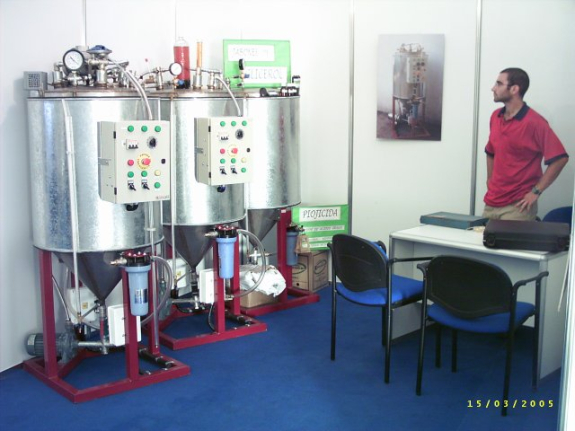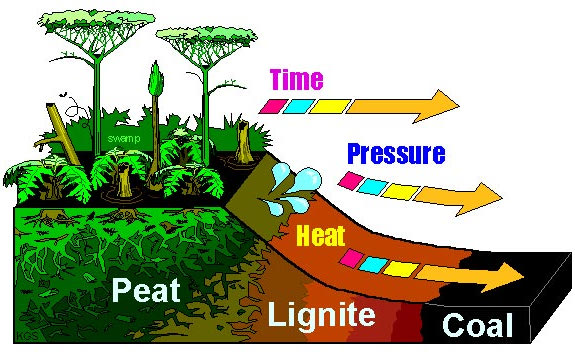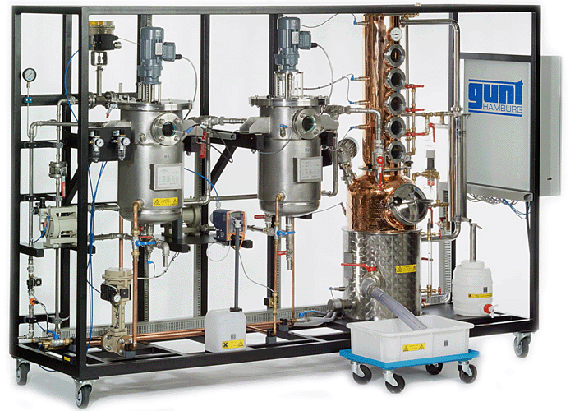
Secondary sources of energy: Chemical energy
Remember how energy can neither be created nor destroyed, only transformed from one type to another? The primary sources of energy in the stars are transformed on earth into the various energy carriers you are probably more familiar with.
Fossil fuels
These are (hydro)carbons (i.e. chemicals mostly built up out of hydrogen and carbon) formed by anaerobic decomposition of buried dead organisms, over geological timescales. Organisms can be plants, or creatures that feed on plants, or creatures that feed on other creatures. If you follow the chain back, you'll come to plants collecting solar energy and using it (via a process known as photosynthesis) to convert carbon dioxide into organic compounds, mainly sugars.
So essentially, fossil fuels are chemically stored solar energy! The problem with fossil fuels is that we're currently using them at a much faster rate than they are formed. Meanwhile, the carbon dioxide released by burning them influences the climate.
Wood and other plant matter
Since these were the basis for fossil fuels, they hardly need explaining. If they aren't dried before burning, a substantial part of their energy will be consumed by evaporating the water in them. The energy in this water vapor is usually not captured and is lost.
Ethanol
Ethanol can be made via fermentation or as a petrochemical via the hydration of ethylene. Of course, only ethanol produced by fermentation can be considered carbon-neutral.
Fermentation is the process where sugars from plants are converted into ethanol by yeasts. The sugars in the plants, again, are formed by photosynthesis.
The problem with this process is that it results in a lot of biomatter that is of no use to the fermentation process. For example only the grain seeds can be used for ethanol production. Most of the plant is useless in this way. Producing cellulosic ethanol would make this process much more sufficient. Another worry is that growing plants to produce ethanol might hurt food production.
But again, the root source of the energy embodied in ethanol is the sun.
Biodiesel / vegetable oil
 These are lumped together because biodiesel is usually made from vegetable
oils or used cooking oil, via a process called transesterification. These
oils are pressed from seeds or fruits or beans of plants. The main reason to
make biodiesel is that diesel engines usually require modifications to run on
straight vegetable oils, while biodiesel requires little to no modification of
a diesel engine.
These are lumped together because biodiesel is usually made from vegetable
oils or used cooking oil, via a process called transesterification. These
oils are pressed from seeds or fruits or beans of plants. The main reason to
make biodiesel is that diesel engines usually require modifications to run on
straight vegetable oils, while biodiesel requires little to no modification of
a diesel engine.
As with ethanol, only a small part of any plant can produce oil. And the same oils that can be used for biodiesel are also used as food. The process uses a strong base like NaOH or KOH as a catalyst, and produces glycerin as a by-product.
Since it is made from plants, the real energy source is again the sun.

This work
is licensed under a Creative Commons
Attribution 3.0 Unported License.
| This post is part of our Energy Primer lunchtime series.
Read all of the entries: |
Want more in-depth information? Browse through our books.
Or explore more posts by date or by subject.
About us: Anna Hess and Mark Hamilton spent over a decade living self-sufficiently in the mountains of Virginia before moving north to start over from scratch in the foothills of Ohio. They've experimented with permaculture, no-till gardening, trailersteading, home-based microbusinesses and much more, writing about their adventures in both blogs and books.
Want to be notified when new comments are posted on this page? Click on the RSS button after you add a comment to subscribe to the comment feed, or simply check the box beside "email replies to me" while writing your comment.
- Remove comment

- Remove comment
- Remove comment
- Remove comment


